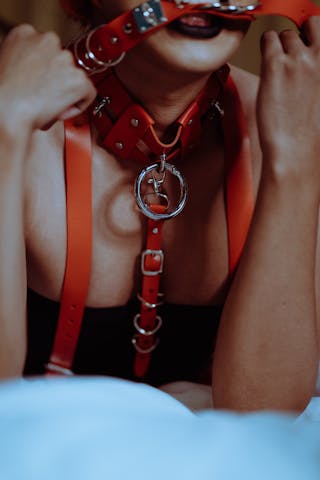Navigating the world of dating can be challenging for anyone, but for those who identify as LGBTQ and are also autistic, there can be even more obstacles to overcome. Finding love and connection can be a struggle, but with the right support and resources, dating can be a fulfilling and positive experience.
Finding love can be a thrilling adventure, especially when navigating the complex intersection of identity and dating. Whether you're on the autism spectrum or identify within the LGBTQ+ community, the journey to finding your perfect partner can be both exciting and challenging. Fortunately, there are resources and communities that can provide support and guidance along the way. If you're ready to explore the vibrant and diverse dating scene, check out this helpful guide to finding your perfect partner in Brighton here.
Understanding Autism and LGBTQ Identities
If you're an African American senior looking for love, give these dating sites a try at Pussy Pervert.
Autism is a neurodevelopmental disorder that affects how a person communicates, interacts with others, and experiences the world around them. People on the autism spectrum can have a range of strengths and challenges, and their experiences can vary widely. Similarly, LGBTQ individuals experience unique challenges in society, including discrimination, stigma, and a lack of understanding from others.
Check out this comprehensive review of an innovative online dating platform and give it a try to find your perfect match!
When someone identifies as both autistic and LGBTQ, it's essential to recognize and validate their experiences and identities. They may face double discrimination and struggle to find acceptance and understanding in both the neurotypical and LGBTQ communities. It's crucial to create inclusive spaces where individuals can feel safe and supported in exploring their identities and seeking meaningful connections.
Discover exclusive discounts on gloryhole admissions
Challenges of Dating for Autistic LGBTQ Individuals
Dating can be particularly challenging for autistic LGBTQ individuals due to a variety of factors. Social interaction and communication difficulties can make it hard to navigate the complex world of dating, especially within the LGBTQ community, which often emphasizes socializing and networking. Additionally, sensory sensitivities and emotional regulation can impact how autistic individuals navigate intimate relationships and physical affection.
Furthermore, the stigma and misconceptions surrounding autism and LGBTQ identities can lead to feelings of isolation and rejection. Many may struggle to find understanding and acceptance within the dating world, leading to a sense of hopelessness and low self-esteem. It's essential to address these challenges and provide support for individuals navigating the intersection of autism and LGBTQ identities.
Creating Inclusive Dating Spaces
In recent years, there has been a growing recognition of the need for inclusive dating spaces for autistic LGBTQ individuals. Many dating platforms and organizations have taken steps to create safe and supportive environments for individuals to connect and build relationships. These spaces prioritize understanding and acceptance, providing resources and support for those navigating the complexities of dating while being both autistic and LGBTQ.
Inclusive dating spaces can offer various features to support autistic LGBTQ individuals, such as sensory-friendly events, clear communication guidelines, and resources for understanding boundaries and consent. These platforms also strive to educate the broader LGBTQ community about autism and neurodiversity, promoting acceptance and understanding.
Tips for Autistic LGBTQ Dating
For autistic LGBTQ individuals navigating the dating world, there are several strategies and tips that can help make the process more manageable and fulfilling. Here are some helpful suggestions:
1. Seek out supportive communities and groups specifically tailored to autistic LGBTQ individuals. These spaces can provide understanding and a sense of belonging.
2. Be open and honest about your needs and boundaries with potential partners. Communication is key in any relationship, and being upfront about your neurodiversity can help foster understanding and acceptance.
3. Take the time to understand your own needs and preferences in dating. Whether it's sensory sensitivities, communication styles, or emotional regulation, knowing yourself can help you navigate relationships more effectively.
4. Educate yourself and others about autism and LGBTQ issues. By increasing awareness and understanding, you can help create more inclusive and supportive dating environments for everyone.
Finding love and connection as an autistic LGBTQ individual can be challenging, but with the right support and resources, it's possible to build meaningful and fulfilling relationships. By creating inclusive spaces and promoting understanding, we can ensure that everyone has the opportunity to find love and acceptance, regardless of their neurodiversity or sexual orientation.
- https://meet-singles.themountaintopplay.com/posts/my-best-sex-ever-was-with-a-married-couple/
- https://personals-website.ua-sex.com/posts/best-girl-on-top-sex-positions-woman-on-top-sex-positions/
- https://chat.ua-sex.com/posts/tantric-sex-what-is-tantric-sex-and-everything-you-need-to-know/
- https://meet-women.themountaintopplay.com/posts/my-best-sex-ever-was-with-my-best-friends-ex/
- https://sex-chat.thehottieandthenottie.com/posts/the-25-best-sexy-pyjamas-to-shop-for-valentines-day-2024/
- https://dating-for-free.thehottieandthenottie.com/posts/the-25-best-sexy-pyjamas-to-shop-for-valentines-day-2024/
- https://free-dating-website.themountaintopplay.com/posts/smartest-relationship-resolutions-to-make-as-a-couple-dating-resolutions/
- https://chatting.themountaintopplay.com/posts/bbcs-sex-on-the-couch-is-here-to-teach-us-all-so-much-about-sex-and-relationships/
- https://sex-chat.campsupernow.com/posts/star-sign-sex-toy-recommendations-which-sex-toy-will-drive-you-wild-according-to-the-zodiac/
- https://sex-app.themountaintopplay.com/posts/how-to-come-at-home-for-christmas-expert-sex-tips-for-the-holidays/
- https://hookupguide.campsupernow.com/posts/bisexual-how-to-know-if-youre-bisexual/
- https://matchmaker-website.thehottieandthenottie.com/posts/why-is-dating-sunday-the-busiest-day-on-dating-apps-in-2024/
- https://sex-guide.thehottieandthenottie.com/posts/dakota-johnson-had-to-superglue-a-thong-on-while-filming-fifty-shades-sex-scenes/
- https://sex-chat.thehottieandthenottie.com/posts/first-time-sex-losing-your-virginity/
